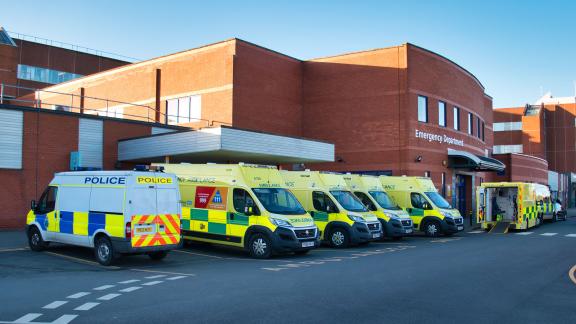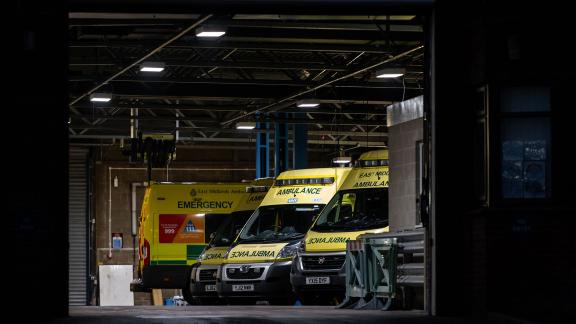NHS finances in Wales: what next?

Government, public sector and NHS finances have been a hot topic for months now, as have the economy, inflationary pressures and the subsequent cost-of-living crisis and its impact.
We need honesty from politicians across all parties on the unprecedented challenge of providing the healthcare people expect with almost 5% less money in real terms at a time of ever-increasing demand.
NHS leaders know public finances across the UK are extremely tight. That’s why we need honesty from politicians across all parties on the unprecedented challenge of providing the healthcare people expect with almost 5% less money in real terms at a time of ever-increasing demand.
The financial challenges facing the NHS in Wales are not unique, with the NHS in all four nations experiencing a real terms squeeze in budgets given inflationary pressures, alongside persistently high levels of demand. It’s also not a problem unique to the NHS – families, businesses and other public services are feeling the pinch, including local authorities, some of which are struggling to deliver the most essential of services within budget. You’d be hard-pressed to find a sector that hasn’t had to change the way they do things or face the consequences.
It would also be remiss not to recognise the impact of the cost-of-living crisis on population health, especially as we move into winter. Some of this impact will be seen in the months and years to come. Some voluntary sector bodies are calling for more support for people to heat their homes as a cost-effective way to keep them well.
So, with the news that health boards in Wales have been set target control totals to reduce their forecasted deficits by 10 per cent, there are inevitably questions being asked. What are they doing about it? And crucially, what could this mean for patients?
We need to change the way we deliver services as we don’t have the staff or money to continue doing what we’ve always done. A value-based healthcare approach is key here.
NHS leaders will do everything they can to deliver the best outcomes for patients with the finite resources available and will continue to make further efficiencies. We need to change the way we deliver services as we don’t have the staff or money to continue doing what we’ve always done. A value-based healthcare approach is key here. NHS leaders are looking at whether there are projects they can scale back or delay starting, prioritising the most cost-effective interventions for the best use of resources to avoid waste, inefficiency, duplication and variation.
We need to remember that decisions made now could have a long-term impact on the future health of the population
A specific example of a change in service delivery to improve efficiencies is one health board’s one-stop shop for early diagnosis and treatment of heart failure, which has reduced admissions and costs by around £2m per annum.
However, we need to remember that decisions made now could have a long-term impact on the future health of the population (and therefore could have implications on future demand and costs).
There are some areas that will require Welsh Government support to review policy and decision making at a national level, which are outside the NHS’s sphere of influence and control. Health boards will do all they can to align areas of saving and any changes to services to avoid variation across Wales.
Many organisations have asked teams and departments to come forward with ideas for cost savings, which are being reviewed. Staff are the NHS’s most precious asset. NHS leaders see a recruitment freeze as counterproductive, but vacancies will be scrutinised more closely, especially in non-clinical roles, and there’s a huge focus on reducing agency spend. Health boards have already gone a long way in addressing this. Another area under scrutiny is non-essential travel and events.
The cost of medicines has gone up (by an average of 17 per cent, according to the health minister), but so has the volume of medicines prescribed. For example, some commonly used medicines have increased from around 80p last year to £2.80 this year. Prescribers will also be looking at trying to avoid people stockpiling prescription medicines when they no longer need them. Therefore, some patients may see a change in their medication to more cost-effective brands that still provide the same medical benefits, or their GP practice might be in touch to conduct a medicines review.
NHS organisations will be doing comprehensive impact assessments before making any changes to services, working closely with clinical teams, citizens voice body Llais and care groups to inform decisions, engaging with the public before any service change is implemented.
Without longer term financial certainty, breaking away from political cycles, NHS leaders will be hard pressed to transform services and improve outcomes for patients.
From a governmental budget perspective, we must remember the contribution the NHS makes to local economies, with research showing every pound invested in the NHS results in £4 back into the wider economy. Ultimately this is about people and patients, but from a decision-making point of view, ministers must acknowledge that investment in health boosts labour productivity and economic activity.
There’s no doubt there’s a lot of work to do to meet political expectations amid the greatest financial challenge the public sector has experienced. Without longer term financial certainty, breaking away from political cycles, NHS leaders will be hard pressed to transform services and improve outcomes for patients.
We all need to work together to support and improve the health of the population, tackle health inequalities and reduce the impact of the cost-of-living crisis. That means all sectors, politicians and government departments. We need an open and honest conversation with the public about what we can all do to keep people well, meet our future health and care needs and to ensure the sustainability of the health and care service in Wales for future generations.



